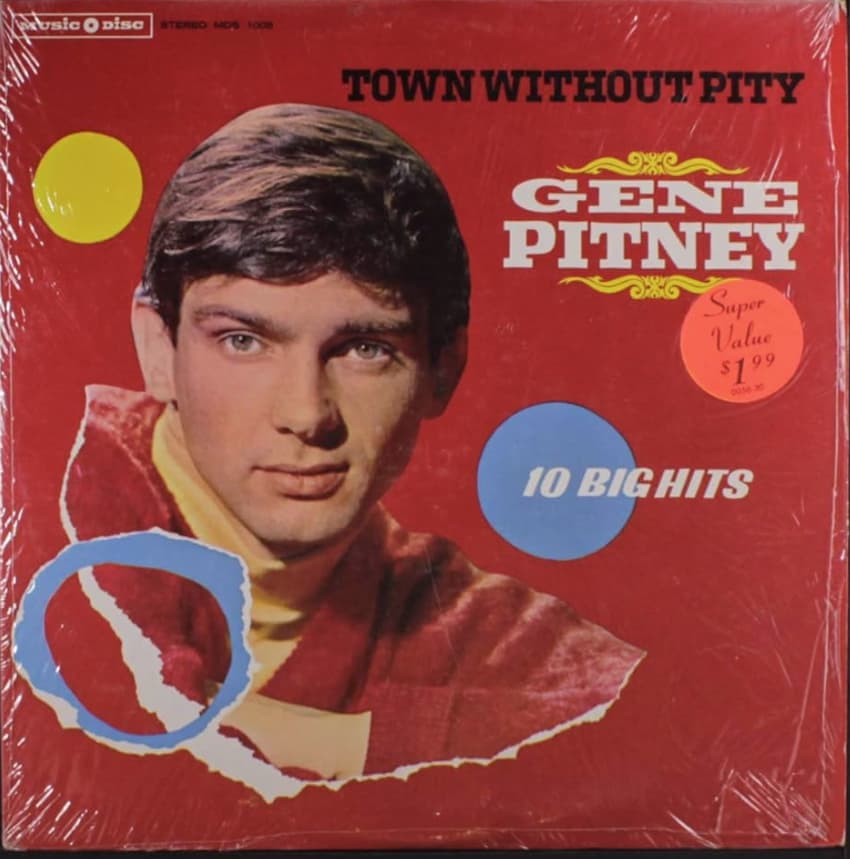
Gene Pitney – “Town Without Pity”: A Dramatic Anthem of Love and Judgment
Gene Pitney’s “Town Without Pity” is a powerful ballad that captures the tension between young love and the judgment of a harsh, unfeeling society. Released in 1961 as part of the soundtrack for the film of the same name, the song became a hit for Pitney, reaching No. 13 on the Billboard Hot 100. Written by Dimitri Tiomkin and Ned Washington, “Town Without Pity” is known for its intense lyrics, lush orchestration, and Pitney’s signature vocal style, which convey both defiance and vulnerability in the face of societal pressure.
The song opens with a dramatic, suspenseful instrumental lead, featuring a descending guitar riff and orchestral flourishes that set a dark, emotional tone. This introduction creates a cinematic atmosphere that reflects the song’s message of conflict and tension. The arrangement, with its sweeping strings and occasional brass, gives the track a rich, layered sound that feels grand yet intimate, capturing both the intensity of young love and the cold judgment of the townspeople.
Lyrically, “Town Without Pity” tells the story of two young lovers who face condemnation from the people around them. Lines like “It isn’t very pretty what a town without pity can do” highlight the cruelty of a society that refuses to accept their love, creating a sense of isolation and struggle. The lyrics convey a sense of hopelessness and frustration, as the narrator expresses his longing for love and understanding in a world that seems bent on tearing them apart. The imagery of a “town without pity” serves as a metaphor for the judgment and coldness of people who prioritize tradition over compassion.
The chorus, “How can we keep love alive, how can anything survive / When these little minds tear you in two?” is a plea for empathy and acceptance, as the lovers struggle to protect their relationship from outside interference. This refrain captures the desperation of young people who feel their love is being crushed by narrow-mindedness and prejudice. Pitney’s delivery of these lines is filled with emotion, making the listener feel the weight of societal pressure on the couple’s love.
Gene Pitney’s vocal performance is the emotional core of “Town Without Pity”. His voice is both strong and tender, with a dramatic intensity that brings the lyrics to life. Pitney’s ability to convey a wide range of emotions—love, anger, sorrow, and defiance—adds depth to the song, making it feel like a personal narrative. His vocal style, with its expressive vibrato and soaring high notes, adds a touch of theatricality that enhances the song’s message of love fighting against the odds.
The orchestration in “Town Without Pity” is lush and cinematic, featuring strings, brass, and guitar that create a full-bodied sound. The strings add a sense of melancholy, while the guitar gives the song a slightly edgy, modern feel. This fusion of classical and pop elements mirrors the song’s theme of tradition clashing with modern values, making it both timeless and of its era. The arrangement builds in intensity as the song progresses, culminating in a powerful climax that reinforces the song’s dramatic message.
Since its release, “Town Without Pity” has become one of Gene Pitney’s signature songs, celebrated for its poignant lyrics and compelling delivery. The song’s themes of love, judgment, and resilience have made it a classic that resonates with listeners who understand the challenges of staying true to oneself in a judgmental world. Its popularity was boosted by its association with the film Town Without Pity, and it has since become a staple in Pitney’s catalog and a favorite for fans of 1960s pop ballads.
“Town Without Pity” remains relevant for its exploration of the conflicts that arise when society’s expectations clash with personal happiness. The song’s plea for compassion and understanding is universal, resonating with listeners across generations. Its dramatic tone and powerful message continue to captivate audiences, making it a timeless anthem for those who believe in the right to love freely.
In the end, “Town Without Pity” is more than just a love song—it’s a reflection on the power of judgment and the resilience needed to overcome it. Gene Pitney’s passionate performance, combined with the song’s lush orchestration and thought-provoking lyrics, creates a piece that is both moving and unforgettable. For fans of classic ballads and anyone who has faced adversity in love, “Town Without Pity” remains a stirring reminder of the strength it takes to hold on to love in a world that doesn’t always understand.